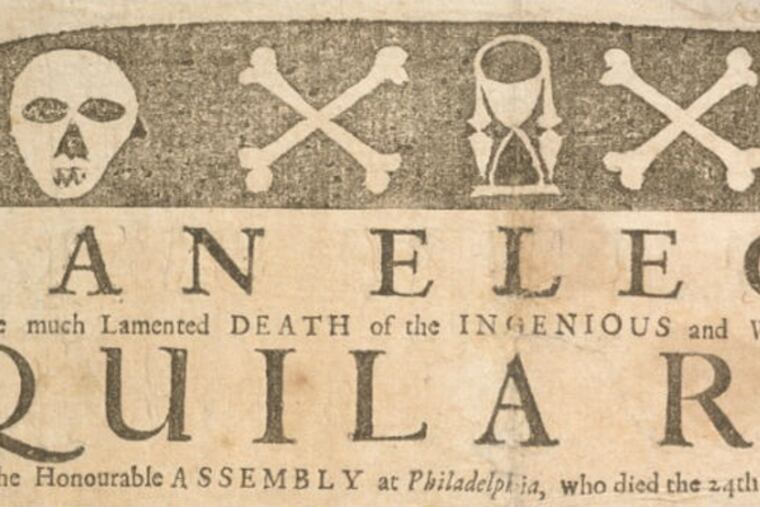The broadside that made the city: Penn Libraries acquires Franklin's first print job
The demise of young Quaker poet Aquila Rose, while surely lamentable, is virtually forgotten. But this obscure death nearly three centuries ago is arguably among the most momentous deaths in Philadelphia's 300-plus years - not for who Rose was, but for what he precipitated.

The demise of young Quaker poet Aquila Rose, while surely lamentable, is virtually forgotten.
But this obscure death nearly three centuries ago is arguably among the most momentous deaths in Philadelphia's 300-plus years - not for who Rose was, but for what he precipitated.
Rose's death brought Benjamin Franklin to Philadelphia and anchored him here, and now the Penn Libraries has acquired the broadside that did the trick - the only known surviving copy of Franklin's first print job.
That job involved a poem written by Franklin's first employer - An elegy on the much lamented death of the ingenious and well-belov'd Aquila Rose, clerk to the honourable assembly at Philadelphia, who died the 24th of the 6th month, 1723, aged 28.
The teenaged Franklin printed the piece when he first arrived in the city, his first professional effort and his entrée into the Philadelphia business world.
Had Franklin not succeeded, he likely would have continued south, scholars say, and Philadelphia would not even have a University of Pennsylvania (founded by Franklin) to acquire and exhibit the single Aquila Rose sheet in its library, the only known example of the broadside to survive.
The university declined to comment on the price of the acquisition.
Aquila Rose will be on display through Feb. 10 on the first floor of Van Pelt-Dietrich Library Center. (A digitized copy of the broadside is at http://hdl.library.upenn.edu/1017/d/print/6768025)
"There were only two printers in the city" when Franklin arrived, said curator Mitchell Fraas, of Penn Libraries' Kislak Center for special collections. "It's not completely unreasonable - if they're not hiring, you move on."
Franklin had been directed to Philadelphia to apply for the job of the recently deceased Rose, poet and pressman, but found when he arrived in the city that the job had been filled.
There was, however, another printer in the young city, the eccentric Samuel Keimer. Keimer, it seems, could compose and set type - but he could not actually print.
Franklin, all of 17, offered to set up Keimer's press and print Keimer's Aquila Rose Elegy - a job he did so well that Keimer took him on.
Within a few years, Franklin dominated city printing, bought out Keimer, and propelled himself and his adopted town into the history books.
The possible existence of the Aquila Rose broadside has been known to scholars - Franklin even mentioned it in his Autobiography - but its elusiveness is legend.
A copy was printed by Philadelphia historian and collector Samuel Hazard in the 1820s. But the original appeared to be lost.
Then Hazard became largely forgotten himself, and it seemed remote that an original Aquila Rose copy would ever be found.
Several years ago, however, antiquarian dealer Carmen D. Valentino, of Port Richmond, acquired an old Hazard scrapbook filled with ephemera - notes, images, and, lodged between a couple of pages, the actual Aquila Rose Elegy.
Valentino will not say where he acquired the scrapbook, but he does say that he owned it quite a while before examining it.
The Aquila Rose Elegy bears a headpiece of skulls and crossed bones, Valentino notes, a very New England Protestant motif that was foreign to the city's Quaker culture.
From the beginning, Franklin was making his mark.
"That Broadside is the foundation of Franklin staying and founding all the great institutions of Philadelphia," said Valentino. "This is the crux of the matter, the historical significance."
Penn holds about a third of Franklin's roughly 900 known surviving printed works, said Fraas. With the acquisition of Aquila Rose, the library now holds Franklin's first and last projects. (The last is the Petit Code de la raison humaine, printed in French in 1782 when Franklin was serving as the U.S. ambassador to France.)
James Green, of the Library Company, and a scholar of Franklin's printing, called the workmanship of the Aquila Rose print job "impeccable."
"It got him a job and it eventually drove Keimer out of business," said Green. "This is the moment. It is the first thing Franklin printed and the moment he saw where he could become the biggest printer in America."
215-854-5594
@SPSalisbury